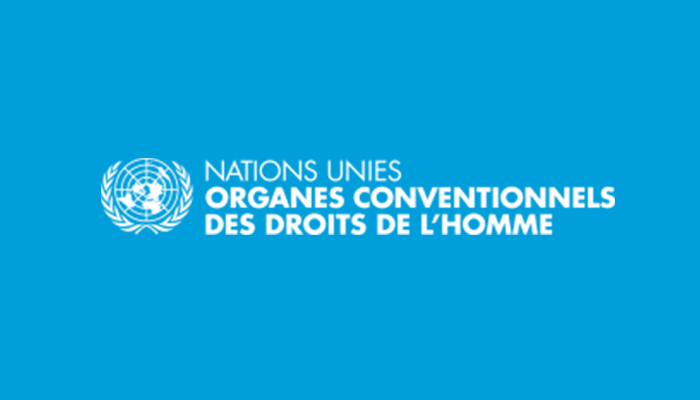La CNCDH en deux mots
Assimilée à une Autorité administrative indépendante, la Commission nationale consultative des droits de l'homme (CNCDH) est l'Institution nationale de promotion et de protection des droits de l'homme, accréditée auprès des Nations Unies.
Elle remplit en toute indépendance, auprès du Gouvernement et du Parlement, une mission de conseil et de proposition dans le domaine des droits de l’Homme, du droit et de l’action humanitaire, et une mission contrôle du respect par la France de ses engagements en la matière. Elle a en outre un rôle d'éducation aux droits humains.
La CNCDH fonde son action sur trois grands principes : l'indépendance, le pluralisme et la vigilance.
[Découvrez ci-dessous un court film d'animation présentant la CNCDH.]
Transcription de la vidéo
Il s’agit d’un film d’animation, les images dessinées viennent illustrer le propos et les situations évoquées.
La voix off dit :
Vous êtes-vous déjà demandé qui veille au respect des droits de l’homme ?
En France, l’institution dont c’est le rôle est la CNCDH, la Commission Nationale Consultative des droits de l’homme, si vous préférez. La CNCDH est totalement indépendante.
Elle est composée de 64 membres très différents. On y trouve des associations, des juristes, des syndicats, des universitaires, des représentants des religions et bien d’autres.
Elle est née juste après la seconde guerre mondiale. En 1947, en matière de Droits de l'Homme, on avait quelques besoins…
C'est ainsi que son premier président, René Cassin, participe pour la France à la rédaction de la Déclaration universelle des droits de l'Homme.
Et aujourd’hui ? C'est vrai, les sujets de manquent pas…
En France, il y a 4 millions de personnes mal logées.
80 % des enfants vivant en bidonvilles et en squats ne sont pas scolarisés.
80% des femmes handicapées ont été victimes de violences.
On compte plus de 100.000 victimes d’esclavage moderne.
Et dans les prisons surpeuplées, les détenus vivent dans des conditions inhumaines…
La CNCDH contrôle le respect par la France de ses engagements internationaux en matière de droits de l’homme.
Par exemple, elle alerte sur les manquements au droit au logement et dénonce les failles des politiques publiques auprès des Nations Unies.
Mais elle ne se contente pas de dénoncer. Elle dialogue avec les pouvoirs publics et tous les acteurs concernés. Elle formule des recommandations pour que ces droits soient assurés.
Enfin, elle contrôle la mise en œuvre de ces recommandations et de celles portées par les Nations UInies.
Bref, elle accompagne tous les acteurs, les pouvoirs publics, les entreprises, les associations… pour que les choses changent en profondeur.
Enfin, la CNCDH se bat pour que chacun prenne conscience qu’il peut agir pour améliorer le respect des droits de l’homme autour de lui.
« La CNCDH, 70 ans d’expertise au service des droits de l’Homme. Les droits de l’Homme, l’affaire de chacun, l’affaire de tous. »
The mandate and role of National Human Rights Institutions (NHRIs) in facilitating remedy, including as a State-based non-judicial mechanism, are identified explicitly in the UN Guiding Principles. NHRIs are instrumental in bridging and mediating concerns over human rights violations concerning businesses, such as, but not limited to, discrimination, labor rights, consumer rights and environmental rights violations. This also frames the relationship of NHRIs to other State-based mechanisms such as domestic courts and regional human rights courts. The bridging role of NHRIs is an important tool or mechanism by which concerns of business-related human rights violations are brought to the attention of these actors. [...]
Keeping NHRIs independent, functional and accessible to all creates an enabling environment where NHRIs can facilitate dialogue among duty-bearers, rights-holders, business enterprises and civil society, and recommend access to justice, effective remedies and reparations for business-related human rights abuses.
Les membres du Groupe de travail « Entreprises et droits de l'Homme » de l'Alliance globale des INDH salue la publication du rapport sur l'accès à la justice et la réparation pour les victimes de violations des droits de l'Homme du fait d'activités conduites par les entreprises.
Date d’adoption
25 juin 2018
Thème
Entreprises
International
Téléchargements
Mis à jour le 27 janvier 2022
The mandate and role of National Human Rights Institutions (NHRIs) in facilitating remedy, including as a State-based non-judicial mechanism, are identified explicitly in the UN Guiding Principles. NHRIs are instrumental in bridging and mediating concerns over human rights violations concerning businesses, such as, but not limited to, discrimination, labor rights, consumer rights and environmental rights violations. This also frames the relationship of NHRIs to other State-based mechanisms such as domestic courts and regional human rights courts. The bridging role of NHRIs is an important tool or mechanism by which concerns of business-related human rights violations are brought to the attention of these actors. [...]
Keeping NHRIs independent, functional and accessible to all creates an enabling environment where NHRIs can facilitate dialogue among duty-bearers, rights-holders, business enterprises and civil society, and recommend access to justice, effective remedies and reparations for business-related human rights abuses.
Date d’adoption
25 juin 2018
Thème
Entreprises
International
À voir aussi

Actualité
26 novembre 2025
Directive « Omnibus I » : la CNCDH et le réseau européen des INDH alertent sur les reculs normatifs en matière de respect des droits humains et de protection de l’environnement par les entreprises.

Actualité
25 septembre 2025
Jeudi 25 septembre, la CNCDH a adopté un avis comportant une série de recommandations pour préserver et soutenir les organes des traités, comités composés d’experts indépendants et essentiels pour la protection des droits humains.

Actualité
26 mai 2025
Dans un avis adopté le 20 mai la CNCDH alerte sur la proposition de directive « Omnibus I » de la Commission européenne, susceptible de détricoter des avancées normatives essentielles pour protéger les droits humains et l’environnement dans le cadre des activités des entreprises.

Avis
22 mai 2025
Dans un avis adopté le 20 mai la CNCDH alerte sur la proposition de directive « Omnibus I » de la Commission européenne : résister à la dérégulation au détriment des droits humains et de l’environnement.

Actualité
15 avril 2025
Du 15 au 17 avril 2025, la France est examinée par le Comité contre la torture des Nations Unies chargé de surveiller l’application de la Convention contre la torture et autres peines ou traitements cruels, inhumains ou dégradants par ses États parties.

Actualité
14 mars 2025
Dans une nouvelle déclaration, le réseau européen des INDH (ENNHRI) fait de ses inquiétudes concernant la directive omnibus récemment présentée par la Commission européenne et propose des axes de travail pour que soit garanti le respect des droits humains.

Actualité
19 février 2025
Dans un avis adopté le 13 février 2025, la CNCDH souligne les insuffisances des COP en matière de droits humains. Face aux crises planétaires, elle appelle à une diplomatie environnementale intégrée tenant compte des trois crises et intégrant les droits humains.

Actualité
12 février 2025
Dans un courrier adressé notamment au Président de la République et au Premier ministre, le président de la CNCDH les interpelle sur la position de la France concernant l’initiative de « législation omnibus » annoncée par la Commission européenne.

Actualité
26 novembre 2025
Directive « Omnibus I » : la CNCDH et le réseau européen des INDH alertent sur les reculs normatifs en matière de respect des droits humains et de protection de l’environnement par les entreprises.

Actualité
25 septembre 2025
Jeudi 25 septembre, la CNCDH a adopté un avis comportant une série de recommandations pour préserver et soutenir les organes des traités, comités composés d’experts indépendants et essentiels pour la protection des droits humains.

Actualité
26 mai 2025
Dans un avis adopté le 20 mai la CNCDH alerte sur la proposition de directive « Omnibus I » de la Commission européenne, susceptible de détricoter des avancées normatives essentielles pour protéger les droits humains et l’environnement dans le cadre des activités des entreprises.

Avis
22 mai 2025
Dans un avis adopté le 20 mai la CNCDH alerte sur la proposition de directive « Omnibus I » de la Commission européenne : résister à la dérégulation au détriment des droits humains et de l’environnement.

Actualité
15 avril 2025
Du 15 au 17 avril 2025, la France est examinée par le Comité contre la torture des Nations Unies chargé de surveiller l’application de la Convention contre la torture et autres peines ou traitements cruels, inhumains ou dégradants par ses États parties.

Actualité
14 mars 2025
Dans une nouvelle déclaration, le réseau européen des INDH (ENNHRI) fait de ses inquiétudes concernant la directive omnibus récemment présentée par la Commission européenne et propose des axes de travail pour que soit garanti le respect des droits humains.

Actualité
19 février 2025
Dans un avis adopté le 13 février 2025, la CNCDH souligne les insuffisances des COP en matière de droits humains. Face aux crises planétaires, elle appelle à une diplomatie environnementale intégrée tenant compte des trois crises et intégrant les droits humains.

Actualité
12 février 2025
Dans un courrier adressé notamment au Président de la République et au Premier ministre, le président de la CNCDH les interpelle sur la position de la France concernant l’initiative de « législation omnibus » annoncée par la Commission européenne.


